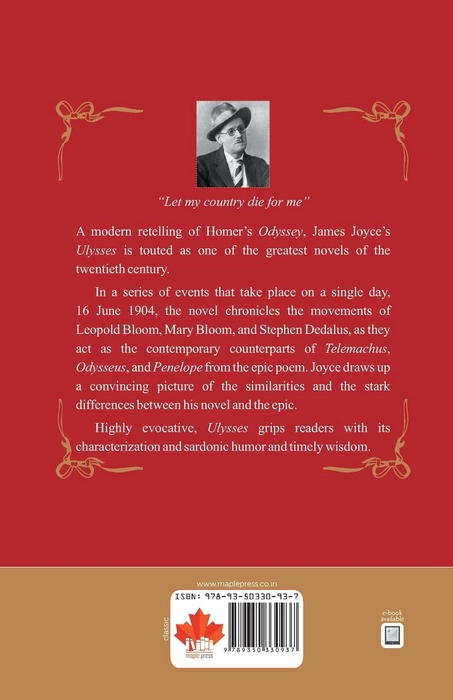Prakash Books - Ulysses - Classics
Product details
Overview
James Joyce (1882–1941) was an Irish expatriate writer widely regarded as one of the most influential figures in twentieth-century literature. Known for his revolutionary narrative techniques, Joyce’s major works, including Ulysses (1922), Dubliners (1914), A Portrait of the Artist as a Young Man (1916), and Finnegans Wake (1939), shaped modernist literature. His writing, particularly in Ulysses, employs a stream-of-consciousness style that blends characters’ inner thoughts, memories, and sensory experiences, exploring themes of identity, exile, and the human search for meaning. Joyce’s innovative prose and use of literary allusions, parody, and linguistic complexity make his work both challenging and deeply rewarding, marking him as a pioneering force who redefined storytelling and narrative structure.
Key Themes
Joyce’s novels and stories focus on themes of exile, identity, and the human condition. In Ulysses, he uses a single day in Dublin to map out universal human experiences, contrasting the epic journey of Homer’s Odyssey with the seemingly mundane lives of Leopold Bloom and Stephen Dedalus. Other themes include religion, sexuality, and existentialism, examined through complex, layered narratives.
Writing Style
Joyce is celebrated for his unique narrative techniques, especially stream-of-consciousness, which allows the reader to experience characters’ internal thoughts, memories, and sensory perceptions. Ulysses is known for its experimental prose, filled with allusions, puns, and wordplay, making it both daunting and innovative. Finnegans Wake pushes this further, with its dense, multilingual text that challenges conventional narrative forms.
Impact and Relevance
Joyce’s work redefined the boundaries of literature and is a cornerstone of modernism. Ulysses challenged traditional storytelling, inspiring writers like Virginia Woolf and William Faulkner. Although controversial for its frank language and exploration of taboo subjects, it is now celebrated for its profound insights into the human experience. The annual celebration of “Bloomsday” on June 16, the day Ulysses takes place, underscores his lasting impact on literature and culture.
Conclusion
James Joyce’s works remain pivotal in literature, renowned for their exploration of modern consciousness, human complexity, and the challenges of identity and exile. His transformative prose, especially in Ulysses, set a new standard for narrative art, making him an enduring influence whose contributions continue to resonate with readers and writers alike.





